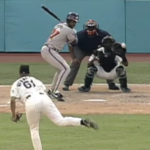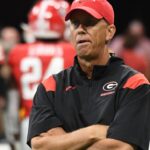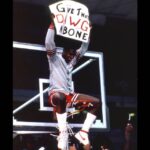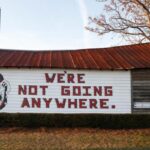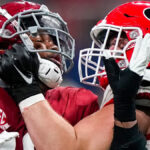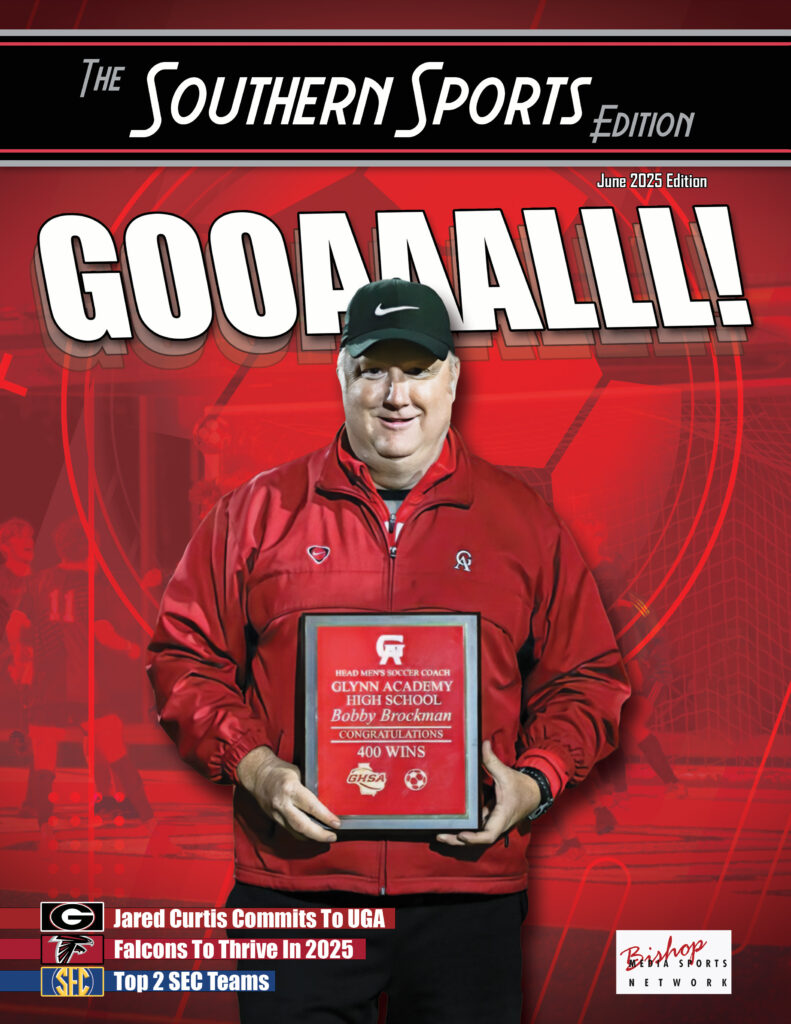Steve Norris
Unfair Wildness
 By: Steve Norris
By: Steve Norris
TheSouthernSportsEdition.com news services
I’m still not over it.
It was October 12th, 1997. The Atlanta Braves were in Miami, Florida for Game 5 of the National League Championship Series and looking to take a 3-2 series lead back to Atlanta with Greg Maddux on the mound.
Maddux had already lost Game 1 at home to Kevin Brown, so Atlanta needed their ace to get revenge on Brown.
However, just before the game, Brown was scratched due to illness and replaced with Livan Hernandez.
What followed is arguably the most controversial game in Braves history. The late Eric Gregg umpired that game and decided for some reason to widen his already wide strike zone, especially to left-handed batters.
This hurt the Braves far more as they had six left-handed batters to the Marlins three. Hernandez was the benefactor and outdueled Maddux 2-1, ending the game on a strikeout of Fred McGriff, where the third strike was at least a foot outside.
If you don’t believe me, do a search for it on YouTube. You’ll be shocked how awful that strike zone was that day.
The Braves would surrender the series to Brown at home two days later 7-4, in yet another first inning implosion by Glavine, while the Marlins would go on to upset the favored Cleveland Indians for the World Series title.
It was a devastating loss for Braves fans, especially after their World Series collapse to the Yankees the previous year.
The fact is, that loss to the Marlins should have never happened in the first place. The Marlins had no business being in the playoffs. They finished 9 games behind the Braves who had won 101 games during the regular season. But thanks to the silliness of the Wild Card, they not only got a chance to beat the Braves, but they were also able to earn the home field advantage by winning just one of the first two games in Atlanta in the NLCS.
Fast forward to last year’s playoffs and the same thing happened to the Braves against the Phillies, except this time it was worse. The hated Phillies finished 14 games…yes…FOURTEEN GAMES behind the Braves.
Yet, when they faced off in the National League Division Series, they were given the opportunity to win one game in Atlanta and immediately get home field advantage in a five-game series.
The Phillies would tee off on Braves ace Max Fried, who was pitching while suffering from the flu, and would win the game 7-6. The Braves would not recover and would go on to lose three games to one.
All of this after playing 162 games.
How does that make sense? Why would a team, who not only failed to win the division, but finished way out of first place, be given such an easy chance to get home field advantage?
Logic says they shouldn’t. In fact, it’s my opinion that it’s time to make the wild card teams work harder to win a playoff series.
Here’s my proposal for the baseball playoffs: Any time a wild card team is facing a division winner in a playoff series, the division winner should get three more home games than the wild card team.
For example, if a division winner is playing a wild card team in the National or American League Division Series, the division winner should get four home games to the wild card teams’ one.
If it’s the National or American League Championship Series, the division winner should get five home games to the wild card winners’ two. This would force the wild card team to have to win two away games no matter what. If they can do that, then they’ve earned the home field advantage.
As for the World Series, that can stay at four games to three no matter who ends up there as a wild card team would have earned their way there by then.
It’s time for Major League Baseball to make the regular season important again if they’re going to keep letting all these wild card teams in.
Unfortunately, it’s run by Rob Manfred, arguably the most incompetent commissioner in sports history, so I don’t see him getting a clue any time soon.
Hardwood Shambles
 By: Steve Norris
By: Steve Norris
TheSouthernSportsEdition.com news services
The date was March 16, 1996.
Tubby Smith, Georgia’s head basketball coach in his first year at the school, had just beaten Gene Keady’s number one seeded Purdue Boilermakers 76-69 to advance to the Sweet Sixteen.
This was rare air for the Bulldogs. They hadn’t been this far in the NCAA Tournament since their magical run to the Final Four in 1983.
Unfortunately for Dawg fans, Georgia would lose six days later in overtime to Jim Boeheim’s Syracuse Orangemen in one of the most exciting tournament games in history. At the time, the loss stung for Georgia fans, but we knew Tubby had the program on the right course.
Unfortunately, in May of 1997, the one school that could lure him away, Kentucky, came calling. Smith accepted the job and immediately led the Wildcats to the National Championship the following year.
As for Georgia, the long NCAA Tournament nightmare was just beginning. Little did Dawg fans know that the upset of Purdue would be the last Tournament victory for at least the next 27 years. A streak that is still active to this day.
Yes…you read that right. The University of Georgia, one of the most powerful schools, not only in the SEC, but in the nation for decades now, has a basketball program that hasn’t won an NCAA Tournament game since the previous century.
You’ve heard of the NCAA Tournament, right? The one that basically lets just about everyone in?
When other schools in the state of Georgia like Mercer University have more NCAA Tournament victories (2014 over Duke) in the last quarter century than UGA, there is a serious problem in Athens.
You know the University of Georgia, right? The one whose football program has won the last two football national championships, which means they’re basically printing money due to the influx of donations just from their big time donors alone?
You know, the one who’s also getting over $50 million dollars per year in TV rights money from the SEC right now? And that amount is expected to double to over $100 million per school by 2028.
How could a school this powerful, with this many resources, that is an hour down the road from Atlanta, which is one of the most talent-rich high school basketball cities in the nation, possibly be this mediocre at basketball for this long?
One can only come to one conclusion…
The powers-that-be at Butts-Mehre in Athens simply do not care about basketball.
Well, not for at least 20 years, anyway.
In 1999, then athletic director Vince Dooley hired Jim Harrick to be Georgia’s head basketball coach. Harrick came with major accolades, including leading UCLA to the 1995 national championship.
Unfortunately, Harrick, who had been fired from UCLA in 1996 for allegedly falsifying receipts and then covering it up, got in more trouble at Georgia in 2003 due to an academic scandal just before the NCAA Tournament.
Dooley was so incensed with the situation, that he pulled Georgia out of the tournament and vacated all of Georgia’s wins for the 2003 season. Harrick was subsequently fired five days later.
Since then, Georgia’s coaching hires have been underwhelming, at best: Dennis Felton, Mark Fox, Tom Crean, and now Mike White.
The only coach on that list with any real accomplishments coming in was Crean, who had taken Marquette to the Final Four in 2003 and was the Big Ten Coach of the Year in 2016 while at Indiana while winning the regular season championship. Even with those accolades, Crean went a very disappointing 47-75 over four seasons at Georgia and was fired a year ago.
Now we have Mike White, who just led Georgia to a 16-16 record in his first year, missing the NCAA Tournament yet again. Unfortunately for Georgia fans, this is considered a banner year! After all, the Dawgs only won six games last year, so a ten-game improvement should be seen as a good sign, right? Don’t bet on it.
According to Dawgs247, White’s first recruiting class (2022) was ranked 50th overall.
His 2023 class isn’t much better as it’s ranked 40th overall. So, unless White suddenly becomes Mike Krzyzewski overnight, I don’t see things improving on the hard court for Georgia anytime soon.
Oh, and speaking of the hard court…Georgia’s is falling apart. Literally.
In what can only be described as a perfect metaphor for Georgia’s basketball program, Stegeman Coliseum was closed down a couple of weeks ago because of hazardous conditions due to pieces of the ceiling breaking off and falling onto the court.
This is the same building that is going on 60-years-old and has been mocked by opposing fans for years for being outdated. While UGA did make improvements to Stegeman in 2017, it’s not the kind of stuff that’s going to impress recruits.
It basically amounted to putting lipstick on a pig. It’s far past time to knock Stegeman down and build a state-of-the-art facility.
Kirby Smart showed when he took over the UGA football program, that you have to be willing to spend a lot of money if you want to win championships. For Smart…mission accomplished.
If the powers-that-be at the University of Georgia are not going to step up and make basketball a priority right now, then when will they? What’s the right time if it’s not now?
I wonder if Kirby can coach basketball.
Airing It Out
 By: Steve Norris
By: Steve Norris
TheSouthernSportsEdition.com news services
You don’t have to be a Georgia fan to understand the effect that Todd Monken has had on Georgia’s offense the last three years.
Monken recently was named Offensive Coordinator for the Baltimore Ravens, ending his time in Athens, GA.
Monken created a balanced and creative offense that kept defenses guessing and got the ball to multiple playmakers throughout games. It’s was a thing of beauty to watch and as a Georgia fan, I hate to see Monken go to Baltimore, because watching Georgia’s offense in the past hasn’t always been a treat.
Georgia has historically been known as a running team and for good reason. UGA is known as “Tailback U’, mostly due to the incredibly talented running backs that have come through in the last few decades. Everyone knows about Herschel Walker, Garrison Hearst, Todd Gurley, and Nick Chubb, just to name a few.
However, when it comes to passing the ball, Georgia fans have had to hold their collective breath a lot over the years. When Georgia’s quarterback has had to air it out a lot in games, it usually hasn’t ended well.
I decided to check out the website sicemdawgs.com and found this category: Most Passing Attempts by a UGA Quarterback in a Game.
Here’s the Top Ten results:
Tied at 10th are Aaron Murray and Quincy Carter with 49.
Murray’s was against Auburn in 2013 and Carter against Florida in 1998. Both were losses. Georgia was pounded by the Gators 38-7 and every Georgia fan remembers how that 2013 Auburn game ended. A 43-38 loss where Murray deserved better.
Tied at 7th are Eric Zeier twice and Jake Fromm with 51 attempts.
Zeier’s were against South Carolina (a 24-21 win) and Kentucky (a 34-30 win) in 1994. Fromms’ was an ugly 20-17 overtime loss to South Carolina in 2019 that the Fromm-haters in the Georgia fan base have never been able to get over. While Fromm didn’t play well that day, that loss was a team effort.
At 6th is Zeier again (see a pattern here?) with 53 passing attempts against Auburn at home in 1993. Another ugly home loss (42-28) where Georgia’s defense failed to show up and give our quarterback any help.
At 5th is Zeier again with 54 in an awful Homecoming loss to Vanderbilt in 1994. I was there covering the game that day for 13WMAZ (Macon). It’s probably the worst, most “mailed in” game I’ve ever seen from a Georgia squad.
Tied for 3rd with 55 passing attempts in a game are Quincy Carter and Jacob Eason.
Carter’s performance was in 1999 at Georgia Tech. Another inexplicable loss that could have been easily avoided had Head Coach Jim Donnan just kicked a field goal at Tech’s one-yard-line in overtime.
Instead, he ran Jasper Sanks, who fumbled and Tech recovered. Had there been replay at the time, it would have shown that Sanks was down. Unfortunately for Dawg fans, Tech would hold Georgia scoreless on their next possession and then kick a field goal to win 51-48.
It’s still the last time Georgia Tech has beaten Georgia at Grant Field. Jacob Eason’s 55-attempt performance was in 2016 at Missouri. Eason’s final pass was a 4th Down touchdown completion to Isaiah McKenzie to give the Dawgs a last-minute victory 28-27.
In 2nd place is Cory Phillips with 62 passing attempts against Georgia Tech at home in 2000.
This was a 27-15 loss that sealed Jim Donnan’s fate as head coach. He was fired the next week.
Phillips was 36 of 62 passing, while throwing for 413 yards, yet Georgia only managed 15 points for the game. What’s more frustrating is that all 11 starters for Georgia on defense that year went on to play in the NFL in some capacity.
Which brings us to the game with the most passing attempts ever. The 1993 Cocktail Party. Better known to old school Georgia fans as “The Timeout Game”.
Eric Zeier put the ball in the air a whopping 65 times that game in a 33-26 loss. The field was a mess as it had rained for what seemed like forever.
With five seconds left in the game, Zeier hit Jerry Jerman for what looked like a touchdown and the opportunity to go for two and win the game.
Instead, the referees claimed that Florida defensive back Anthony Lott had called a timeout before the ball had snapped (replay showed he didn’t but it didn’t matter).
The Dawgs would fail to score afterward and suffered yet another heartbreaking loss to Steve Spurrier and the hated Gators.
Georgia went 3-8 in those 11 games, with the three wins coming by four points or less.
Yet, despite two straight national championships, I still hear some Georgia fans complaining that we need a quarterback with an NFL-type arm who can throw the ball around the yard on a regular basis.
Relax, my fellow Dawg fans. Monken and Stetson Bennett have proven that a strong running game along with a quarterback who understands and can run the system is all Georgia needs to be successful.
Former Love
 By: Steve Norris
By: Steve Norris
TheSouthernSportsEdition.com news services
I used to love college basketball.
Wait…let me change that. I used to REALLY love college basketball.
My passion for it began in the 80’s when Georgia had their magical run to the Final Four in 1983.
Unfortunately, that was the last year Georgia would ever get that far. In fact, other than a Sweet 16 run in 1996, Georgia hoops has been in the desert of college basketball.
Since that Sweet 16 appearance, Georgia hasn’t won another NCAA Tournament game. That’s hard to do, much less considering they let in 68 participants to the tournament now.
While my allegiance has always been to UGA first, I grew fond of the Georgia Tech basketball teams in the 80’s.
Tech’s 1985 and 1986 teams were good enough to win the national championship. They were loaded with players like Mark Price, John Salley, Duane Ferrell, and Bruce Dalrymple.
However, just like Georgia, Tech always seemed to find a way to blow it come tournament time.
It was in 1989 during the NCAA Tournament that I found my new team to follow, and that was the Duke Blue Devils.
It was March 26th, 1989. Duke was playing Georgetown in the Elite Eight. Georgia Tech had lost in the first round to Texas and Georgia didn’t make the tournament.
At the time, Georgetown and their head coach John Thompson were a big deal. They had won the 1984 national championship and had barely lost the 1985 national championship to Villanova.
Personally, I hated Georgetown. In my opinion, Thompson was a bully, who whined incessantly during games and off the court. I was sick of his act. They had a freshman named Alonzo Mourning who ESPN and the other sports media regularly hyped up every week.
I thought he was good but he wasn’t THAT good. I was ready for someone to shut him down and knock Georgetown down a peg.
Enter freshman Christian Laettner. That fateful day, Laettner put the clamps on Mourning, holding him to 11 points and five rebounds, while scoring 24 points and adding nine rebounds in a 85-77 victory that sent the Blue Devils to the Final Four.
Georgetown would go on to make the Sweet Sixteen a couple more times after that season but were never the same under Thompson until he retired after the 1997-98 season.
Duke would lose the next week to Seton Hall in the Final Four but my loyalty had been earned.
The next season, my all-time favorite player came along…Bobby Hurley. Hurley, along with Laettner and Grant Hill, would go on to lead the Blue Devils to two national championships. He also set the all-time assist record with 1076 assists; a record he still holds to this day.
For me, these were the golden years of college basketball. The 80’s, 90’s, and 2000’s were the years when you could count on players normally staying all four years, no matter what their star status was. It was easy to follow teams from year to year. Even Shaquille O’Neal, stayed three years at LSU before heading to the NBA in 1992.
Then came the “one and done”. Duke’s first “one and done” was after the 1999 season when Corey Maggette bolted for the pros after helping Duke to the national championship game.
That wasn’t a surprise at the time as Duke was loaded with players like Elton Brand and Shane Battier. Duke wouldn’t have another one-year player until many years later, so for a while it seemed Maggette was just a one-off.
Unfortunately, the “one and one” would go on to become normal for college basketball.
It was around 2010 that my love of college basketball began to wane. That year, Duke barely squeaked by Butler University to win the national championship. I was excited that Duke won but I wasn’t quite as elated as I had been after the 1991, 1992, and 2001 championships that Duke had won.
After that season, I didn’t plan my nights around watching college basketball anymore.
My passion for it had left town and has never come back. I think the reason was because I began to realize that the product had become watered down. The top high school players no longer cared about being great in college.
They just wanted to showcase their talent at some school for a year and then leave. It also didn’t help that the regular season has become an afterthought.
Now that the NCAA Tournament lets in 68 teams, you have to really be bad to not make it in. Plus, most conferences have tournaments at the end of the season, and the winner is considered the conference champion.
That never made sense to me as winning the regular season is much harder. Why reward a bad team who just happens to get hot for a week?
Due to my loyalty to all things UGA, I still find myself turning on a Georgia basketball game now and then. And, sure, I turned on the Duke-UNC game for a few minutes and smiled a little when Duke won.
But going forward, my only hope of ever loving college basketball again depends on if Georgia ever begins to take it as seriously as it does football.
Head Coach Mike White seems to be the right coach at the right time, but he has a tall task in front of him.
Let’s hope he can get it done because I’d really love to get that passion back again and Georgia is the only school I care about anymore.
That Familiar Feeling
 By: Steve Norris
By: Steve Norris
TheSouthernSportsEdition.com news services
For those of us who have been Atlanta Braves fans for over 40 years, we have been through some good times, some bad times, and then some really, really bad times.
There were a few Braves teams in the 80’s that were inexplicably bad. Many times, as the Braves were headed towards yet another loss, legendary Braves announcer Skip Caray would quip, “Well, Folks…you can’t win ‘em all or it would get boring.”
Well, believe me, some of those 80’s teams went out of their way to save us from that boredom.
Then in 1990, things began to turn around. John Schuerholz took over as General Manager and Bobby Cox came back as Manager (he managed the Braves from 1978-1981).
The team finally started making intelligent decisions and good things began to happen. For me, the biggest thing that came along was David Justice.
Now, I realize a lot of people are going to disagree with me here. They’ll say that it was the Braves’ pitching that made them what they were in the 90’s, and I’m not saying they’re necessarily wrong. But every great team has a leader. And Justice was it. Here’s how I know.
I was lucky enough to get to cover the Braves from 1994-1996 while working for 13WMAZ in Macon, GA. I covered somewhere around 20-25 games in that time, and for a guy in his 20’s who had grown up loving the Braves, it was like a day at Six Flags for me.
I got to interview the players on the field while they were taking batting practice, sit in the press box to watch the game, and then go in the locker room after the game to do interviews.
The locker room at that time was full of future Hall-of-Famers that everyone remembers. Chipper Jones, Greg Maddux, Tom Glavine, Jon Smoltz, and Fred McGriff were all present.
However, there was one player the media always went to like a moth to a bug light. And that was David Justice. He had a commanding presence that couldn’t be denied and wasn’t afraid in the least to say exactly what was on his mind. He also didn’t suffer fools when it came to the reporters.
If somebody asked a dumb question, Justice called them out on it. His mouth did get him in trouble with the fans in 1995 when he went on a rant before Game 6 on the World Series, claiming that the fans would hate the team if they didn’t win the series.
However, he still went out and hit the biggest home run in Braves history to win the series that night.
The following year, Justice only played in 40 games of the 1996 season due to a shoulder injury. He wasn’t available for the World Series against the Yankees, and it led to the biggest collapse in Braves history.
After getting out to 2-0 lead in the series on the road and headed back home, the Braves managed to lose four games in a row, dropping the series 4-2.
As a Braves fan, I’m still not over that World Series loss. I couldn’t sleep for a week. David Justice was my favorite player and it frustrated me that he wasn’t able to be in the lineup to help keep that loss from happening. Still, I was looking forward to the 1997 season when he’d be back healthy and the team would be even stronger.
Then, for me and many other Braves fans, the worst trade in Braves history happened.
On March 25th, 1997, in a salary-cutting move, the Braves traded David Justice and Marquis Grissom (my second favorite Braves player) to the Cleveland Indians for Kenny Lofton and left-handed relief pitcher Alan Embree.
As a Braves fan, I was devastated. I had seen how clutch Justice could be when they needed him. I had seen what his presence meant in the clubhouse when he kept reporters away from other players who preferred not to be interviewed (like Grissom, Maddux, and McGriff). I felt like Justice was “the straw that stirred the drink” as the saying goes.
He went on that year to lead Cleveland to the World Series while Kenny Lofton was a problem child who never really wanted to be in Atlanta, lasting one year before re-signing with Cleveland the next year.
Embree was basically an average pitcher at best, who didn’t bring much value.
Meanwhile, the Braves went on to lose in the National League Championship Series to the underdog Florida Marlins 4-2, in what is still another playoff loss I’ve never really gotten over.
Which brings me to my point…there is no substitute for chemistry on a team, and some players are way more important than others.
After dealing Justice, the Braves never made it to the promised land again with Cox as manager. While eventually winning 14 straight division titles, they only played in one more World Series; in 1999, getting blown out 4-0 by the Yankees.
Now, here we are in 2023 and I’m afraid history is repeating itself. After the exhilarating and unexpected World Series win in 2021, the Braves let the biggest part of their chemistry go by not signing Freddie Freeman to another contract. And what happened?
A shameful first round playoff loss to the Phillies where Freeman’s leadership was sorely missed.
It’s hard for me to criticize Braves General Manager Alex Anthopolous for losing Freddie. After all, it was Anthopolous who made the moves halfway through the 2021 season that led to the World Series win.
But I’m getting that old feeling again. That while the Braves will be loaded with talent and most likely playoff-bound for several seasons to come, they’ll still find a way to blow it now that the chemistry has been irreversibly changed. I really hope I’m wrong.
The Barn Sign
 By: Steve Norris
By: Steve Norris
TheSouthernSportsEdition.com news services
Ross Smith had seen enough…and decided to let the world know about it.
It was Saturday, October 28th, 2000. Smith’s beloved Georgia Bulldogs had just suffered another frustrating loss to Steve Spurrier and the Florida Gators. It was the Dawgs’ 10th loss to the Gators in 11 games dating back to 1990, and Dawg fans were getting tired of it.
“We were angry that (Head Coach) Jim Donnan had decided to play Quincy Carter at quarterback over Cory Phillips.” Ross Smith, cousins and friends wanted people to know about it.
The week before, Carter was out due to injury, so Cory Phillips stepped in and led the Dawgs to a road victory over the Kentucky Wildcats, throwing for 400 yards and four touchdown passes.
“We thought for sure that Phillips had earned the chance to play against Florida,” said Smith. “Instead, Donnan went with Carter, who went out and threw three interceptions and looked horrible in yet another loss (to Florida).”
And that’s how The Barn Sign was born.
That night, Smith bought some red, white, and black paint and brought the dilapidated former corner store to life with its first message to Dawg fans everywhere: “TO HELL WITH CARTER…PHILLIPS FOR PRESIDENT”
“It was an election year, so going with “President” made sense to me,” said Smith.
The “barn” doesn’t actually belong to Smith. It is owned by his first cousins, James and Jonathan Hitchcock, who live on and operate the farm across the street.
It was originally a corner store from the mid-50’s to the late 70’s, according to Smith.
“There was a family that ran it and lived in a small room on the side of the building,” said Smith. “I’m not sure how they did it all those years. The room they lived in wasn’t as big as my truck and there’s never been any running water.”
After the first message in 2000, Smith began changing the sign a few times a year.
“I would change it at the end of the season, on National Signing Day (which was in February then), two weeks before the season to get Dawg fans pumped up, and then after the Florida game.
If we lost the Florida game, I would put up a message ribbing Gator fans, and if we’d won, I’d just put up the score. Unfortunately, I didn’t get to put the score up very much the first ten years or so,” Smith said laughingly.
Around 2010, the building began to rot in some places due to water leaks when it rained. Smith came home from a trip one day and noticed the building was leaning badly. “I just figured that was it. I was done painting The Barn Sign,” said Smith.
What he didn’t realize was how popular the sign had truly become. “People were sending me messages on Facebook asking me when I was going to fix the sign and paint it again,” said Smith. “I was fresh out of college and didn’t have a lot of money. I told the fans that if they wanted the sign back up, I needed them to donate money to help me pay for it.
I figured I needed around $1500 to make repairs, so I set up a PayPal account and raised $1700 in ten days. In fact, I had to turn the account off because money was coming in so fast.” Smith said.
Once the sign was repaired, its popularity began to grow exponentially. Smith has been interviewed by ESPN along with other large newspapers.
The Barn Sign Facebook page is approaching 55,000 “likes” while Smith’s daily page posts attract a lot of traffic.
Even while I was interviewing Smith in front of the sign, located on Highway 15 between Tennille and Wrightsville, around 15-20 people parked on the highway next to the sign to get a glimpse and take pictures in front of the iconic building. Of course, the current sign has a lot to do with that. Today it reads:
21-22 BACK-TO-BACK NATIONAL CHAMPIONS.
For Smith and all Georgia fans, it’s truly the best message ever and a “sign” that like Georgia football, The Barn Sign has a lot of great years ahead of it.
It Just Means More
 By: Steve Norris
By: Steve Norris
TheSouthernSportsEdition.com news services
If there’s one thing that truly confuses fans of college football teams from other conferences, it’s why many fans of SEC teams pull for other SEC teams against non-conference rivals.
The chant of “SEC!! SEC!!” can be heard in stadiums all over the country almost every week and especially during the bowl weeks.
In fact, the SEC Network uses that chant to promote itself pretty regularly. But why? Why do fans of other conferences not feel that way about their conference members?
For me, when I’m watching another SEC team play a team outside the conference, it comes down to this…when in doubt, pull for the SEC neighborhood, and it started when I was little.
I grew up in a Georgia household. Both of my parents graduated from the University of Georgia in 1969 and married right after graduation. I came along about a year later.
My mother is definitely a Bulldog fan but it was my dad who truly burned red and black in my formative years.
My dad hated Florida, Tennessee, and Auburn as much as anybody. But one thing he truly hated more was what he referred to as “The Midwest media bias against the SEC.”
In the 60’s and 70’s, sports journalism was dominated by the writers from the Midwest. When it came to the polls, the Heisman, and naming the national champion, teams like Notre Dame, Penn State, Ohio State, and the Big Ten, in general, always seemed to receive the benefit of the doubt.
It all began to change in 1984, when the University of Georgia, along with the University of Oklahoma, sued the NCAA in the Supreme Court over TV rights and won.
The victory meant that conferences and schools could immediately begin negotiating their own television deals.
Once the SEC was able to get their product in front of many millions of more viewers every year, the building of the SEC dynasty began.
Fast forward to present day. In the last fifteen years, the SEC has had a team in the national championship game every year but one. Five different SEC teams have won the national championship game.
The SEC arguably has the best teams, the best coaches, the best recruiting, the best stadiums, the best tailgating, and most of all, the best and most rabid fans, which is why ESPN begged the SEC to take their money.
All of this adds up to bring me to my point: The SEC is a pretty nice neighborhood to live in. It’s so nice that blue blood programs Oklahoma and Texas told the Big 12 to pound sand last year and abruptly announced that they were leaving as soon as possible.
The reason, of course, is money (it usually is). The SEC TV rights net each school some serious bank every year and it continues to go up.
In 2021, each SEC school got approximately a $55 million payout. In 2024, it’s expected to be around $70 million.
Currently, the Big 12 is expected to pay out around $28 million per school. And that, Ladies and Gentlemen, is why Oklahoma and Texas can’t wait to be a part of the neighborhood.
Now, just because you live in a nice neighborhood, it doesn’t mean you have to like all of your neighbors. But it’s still important for your neighbors to keep their part of the neighborhood looking good.
It’s important to pull for that. This is why I always say, “When in doubt, pull for the SEC.” For some of you SEC fans, there is never any doubt. You pull for your team and everybody else can burn.
I have a Georgia buddy that always says, “I wouldn’t pull for Florida if I was on the team plane and both engines went out.” I certainly understand that and as a Georgia fan I could never pull for Florida, either.
However, I always want the neighborhood to look good and the best way to do that is with money. You only get a lot of money from the likes of ESPN if the product is really good from top to bottom. So, when in doubt, pull for your neighbor. All the other neighborhoods can burn.
